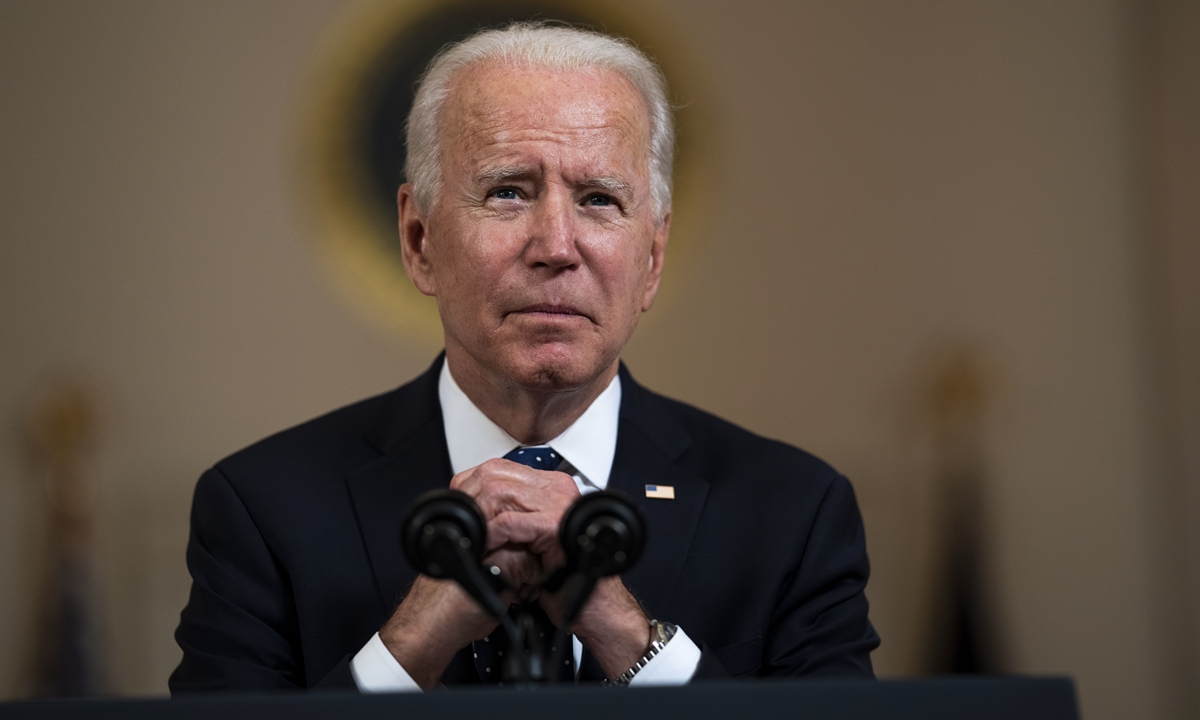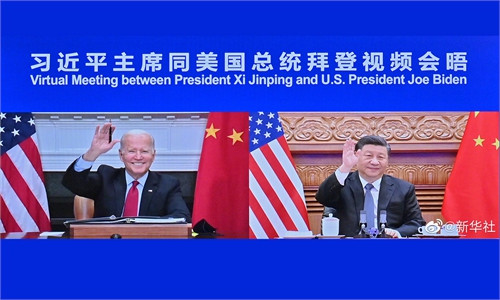Taiwan media deceive themselves to believe Biden supports ‘Taiwan independence’
US actions, not Biden’s ‘slip of tongue,’ are what really matters

US President Joe Biden Photo: IC
After the virtual meeting between Chinese President Xi Jinping and US President Joe Biden on Tuesday, Biden's ambiguous statement on the Taiwan question triggered self-deceiving interpretations in the island that Washington may be sending pro-secession signals.
Experts said that China must be highly alert about the uncertainty embedded in the various contradictory US statements, and be prepared to respond to unpredictable situations and to resolve the Taiwan question decisively when needed.
In the first public appearance after the Xi-Biden meeting, Biden said "We [US] made very clear we support the Taiwan Act, and that's it… Its independence," he went on. "It makes its own decisions."
"I said that they have to decide - Taiwan, not us. We are not encouraging independence," Biden later clarified to media, CNN reported.
Biden's remarks were immediately hyped by Taiwan media, which suggested that Biden could be implying that Taiwan's "independent sovereign status," and intentionally skipped Biden's expression of "not encouraging independence."
"The Taiwan-related content of the Xi-Biden meeting is quite clear. The US government has long reiterated its position that it does not support Taiwan secession. We warn the DPP authorities and secessionists that they will never succeed in seeking secession by external forces," Zhu Fenglian, spokesperson of Taiwan Affairs Office of the State Council, said on Wednesday.
"We will take resolute measures against any provocation, coercion or even crossing of the red line," Zhu said.
"It is normal for Taiwan media to interpret and even misinterpret these remarks in their favor," Wang Jianmin, a senior cross-Straits expert at Minnan Normal University, told the Global Times on Wednesday.
"No matter what their attitude is, it does not change the fact that Taiwan is not a sovereign country and has no sovereign status," Wang said.
Some experts pointed out that Biden's ambiguous remarks are a dangerous signal and reflect the continuation of the US' strategy of using Taiwan to contain the Chinese mainland.
"There is no need to analyze Biden's meaning word for word," Lü Xiang, a research fellow at the Chinese Academy of Social Sciences, told the Global Times.
"It is known that Biden is not articulate. Since taking office, he has uttered all sorts of strange words and expressions. Another confusing and unclear statement is not surprising," the expert said. "What is noteworthy is not what Biden said, but what actions the US will take."
The US has sent military aircraft to the island twice in 2021, which is a serious provocation that China has countered accordingly. Whether the US will make further moves to escalate the tensions need to be closely watched, Lü said.
"Although Biden has dialed back some of the more aggressive approaches of the Trump era since he took office, he has repeatedly shown duplicity and tested China's bottom line," Wang Dong, an expert on China-US relations at Peking University, told the Global Times on Wednesday.
China must pay great attention to the high degree of uncertainty implied by the various contradictory statements of the US, and be prepared to respond to unpredictable situations, Lü said.
"If the US takes further actions to provoke the situation, it may lead to a change in the nature of the Taiwan question in one or two years as China will have to take decisive measures," the expert said.
In his virtual meeting with Biden on Tuesday, President Xi stated clearly that China has the patience and will strive for the prospect of peaceful reunification with utmost sincerity and efforts. "But if separatist forces for 'Taiwan independence' provoke us, force our hand or even cross the red line, we will be compelled to take resolute measures."
The US and the island of Taiwan were scheduled to hold two dialogues in Washington on political and military affairs and on a defense review on Tuesday and Wednesday following the virtual meeting of Xi and Biden, the first of its kind since Biden took office, Taiwan media outlet United Daily News reported on Monday.

